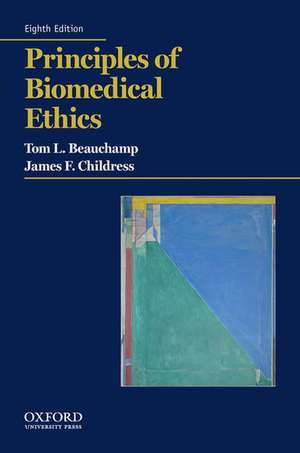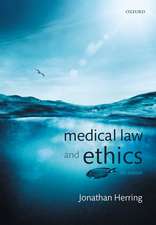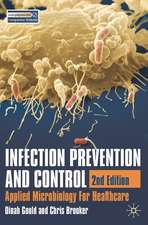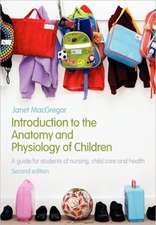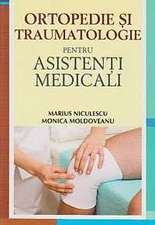Principles of Biomedical Ethics
Autor Tom L. Beauchamp, James F. Childressen Limba Engleză Paperback – oct 2019
care: respect for autonomy, nonmaleficence, beneficence, and justice. Drawing from contemporary research--and integrating detailed case studies and vivid real-life examples and scenarios--they demonstrate how these prima facie principles can be expanded to apply to various conflicts and dilemmas,
from how to deliver bad news to whether or not to withhold or withdraw life-sustaining treatments. Ideal for courses in biomedical ethics, bioethics, and health care ethics, the text is enhanced by hundreds of annotated citations and a substantial introduction that clarifies key terms and concepts.
Preț: 588.82 lei
Preț vechi: 750.48 lei
-22% Nou
112.69€ • 117.20$ • 94.30£
Carte disponibilă
Livrare economică 11-17 februarie
Livrare express 08-14 februarie pentru 103.18 lei
Specificații
ISBN-10: 0190640871
Pagini: 512
Dimensiuni: 155 x 231 x 20 mm
Greutate: 0.64 kg
Ediția:8th edition
Editura: Oxford University Press
Colecția OUP USA
Locul publicării:New York, United States
Descriere
Principles of Biomedical Ethics provides a highly original, practical, and insightful guide to morality in the health professions. Acclaimed authors Tom L. Beauchamp and James F. Childress thoroughly develop and advocate for four principles that lie at the core of moral reasoning in health
care: respect for autonomy, nonmaleficence, beneficence, and justice. Drawing from contemporary research--and integrating detailed case studies and vivid real-life examples and scenarios--they demonstrate how these prima facie principles can be expanded to apply to various conflicts and dilemmas,
from how to deliver bad news to whether or not to withhold or withdraw life-sustaining treatments. Ideal for courses in biomedical ethics, bioethics, and health care ethics, the text is enhanced by hundreds of annotated citations and a substantial introduction that clarifies key terms and concepts.
Recenzii
How many books can be said to have shaped a field of study for decades, and to have helped institutionalize that field around the world? It is hard to imagine what bioethics would be like without Principles of Biomedical Ethics.
In this excellent revision of their classic work, Beauchamp and Childress deepen their account of common morality and the four clusters of moral principles. Successfully responding to earlier criticisms, the authors provide an illuminating analysis of moral philosophy, in addition to bioethics. This book is a must-read for beginners in the field as well as for more advanced scholars.
The Bible of bioethics. Everyone working in the field should have a copy. Over twenty-five years I have come to realize that these are the four principles of practical ethics. In every analysis, I find myself drawn to using them.
Hard to believe, but true. As each time before, this new (now, eighth) edition of the Principles provides considerable benefits over its predecessors: highest quality for newcomers to bioethics; innovative thought for experts; and new material and revision of previous material. What an intellectual achievement!
Principles of Biomedical Ethics is one of the enduring and indispensable contributions to bioethics. It is always a valuable source of information and insight for those of us who are veterans in the field, and even more so for those new to the field in the classroom. Its regular updating is itself of great value, catching new issues that appear.
Over the past forty years Beauchamp and Childress's Principles of Biomedical Ethics has become synonymous with bioethics. This venerable text has only gotten better with age. Beauchamp and Childress are to be congratulated for their historic contributions and the exemplary eighth edition, which deserves a place on the shelf of every bioethicist's library.
Principles of Biomedical Ethics is a standard in the field, and for good reason. With each edition, Beauchamp and Childress focus on not only updating the examples and cases to represent the state of the discipline, but also on refining their arguments and views.
I would rate this book overall as excellent. It's a rare work that is both scholarly and rigorous but also useful as a teaching instrument. The authors' writing is clear and engaging.
I looked long and hard to identify a textbook for the ethics course I teach. I think I have reviewed most of what is available. By far this textbook is the best.
The overall quality is exceptional. This classic work has many strengths, not least of which is its comprehensive introductory material on moral foundations; this introduction is one of the strongest introductions to morality of any text (in biomedical ethics and otherwise) I've used.
